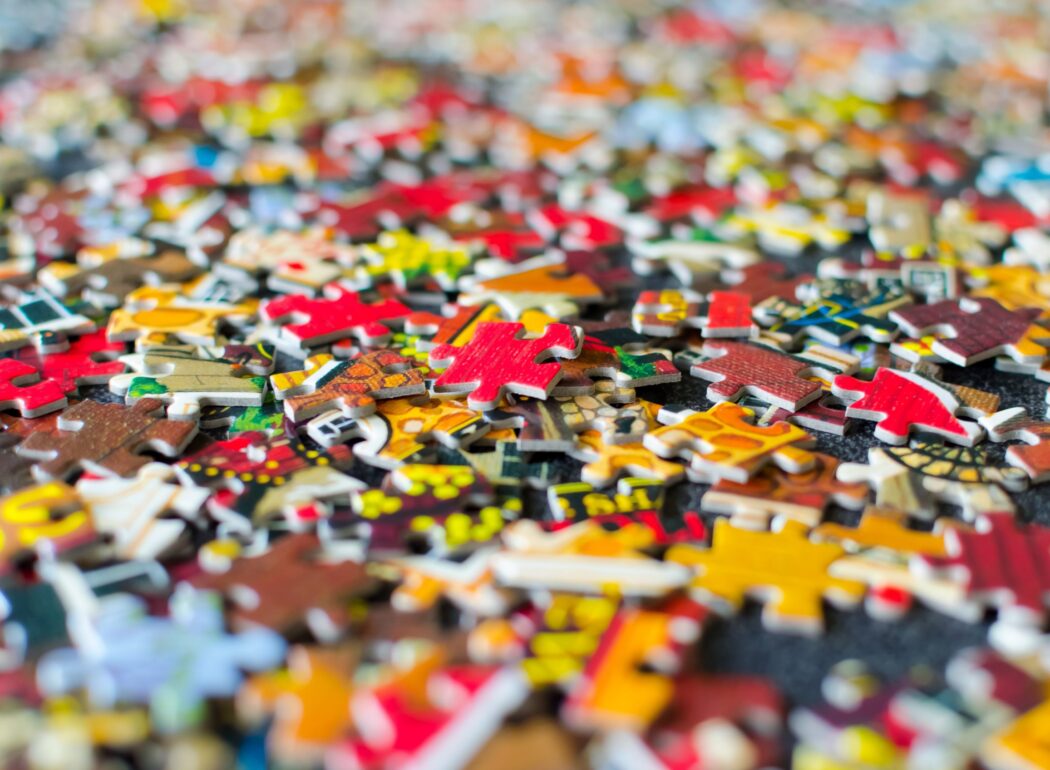Last week, my husband and I decided to experiment when we got home from work. Instead of decompressing on social media, we put on some instrumental music and prepared a spaghetti and meatball dinner together. Then, we sat around the coffee table in our living room to finish the SUSHI puzzle we’d been putting off.
Now, this puzzle is tricky because so many of the pieces have similar shapes and colors. Underneath each piece of sushi is the name of that particular roll. While you might think that would help you organize them, it is tricky because many have similar names. Twenty-six of them have the word “maki” in their name! Although challenging, we both agreed that we find it calming. We focused, worked together, had fun, and we communicated. When you’re building a puzzle, you’re connecting puzzle pieces and the people working together.
Furthermore, studies show that working on a puzzle reinforces brain cell connections. They activate the left and right hemispheres of our brains. In tandem, the left side deals with logic, while the right side fuels creativity. When both sides work together, this increases cognitive function. Also, our brains release a chemical called dopamine whenever we succeed. Dopamine enhances our mood, mental speed, motivation, and short-term memory. So, with every bit of success in finding a matching piece while building a puzzle, our brains release dopamine. It isn’t an exaggeration to say that puzzles are good for you!
Building puzzles helps to build skills for people, young and old. Did you know that the work that WFSU does in communities also encourages skill-building using media and games? Similar to the skills gained by doing a puzzle with a friend, WFSU works to promote children’s learning through supportive adult interaction. Read on to find out more.
Ready To learn: Helping to Build Essential Skills
As a PBS member station, we utilize grants from Ready to Learn Grant (RTL). CPB and WFSU PBS KIDS to fund the development of educational TV and digital media targeted at preschool and elementary-aged kids.
RTL was created to support millions of children who lack the early learning skills needed for academic success. Its goal is to engage children, families, and educators in learning experiences at home. RTL also targets preschool and out-of-school settings, especially those in low-income communities.
The current grant cycle for 2020-2025 is titled “Learn Together: Connecting Children’s Media to Learning Environments to Build Key Skills for Success.” Our grant focuses on three essential skills: everyday literacy, computational thinking, and a world of work. CPB and PBS are also working with early learning experts to create experiences that expose children to career and workforce options. They are working to develop real-world hybrid learning experiences that support intergenerational and family home learning.
While WFSU creates and encourages the use of quality media for learning, we understand that digital learning is only possible or preferable for some. Quality media forces its audiences to analyze, think critically, create, strategize, communicate, and persevere. We call these “soft skills”—non-technical but imperative skills for surviving and thriving in the workforce.
Most of these skills fall under “computational thinking.” This refers to an interrelated set of skills for reasoning and applying concepts to problem-solving. It’s important to remember that you do not need access to media to help your children or students develop essential problem-solving skills.
A fun and meaningful way to help kids in this area is by having them play games—both on and offline.
Skill-building at home with WFSU PBS KIDS
So, if you’re looking for fresh ways to develop these skills at home, consider watching a PBS Show from the RTL series. Great shows like The Cat in the Hat Knows a Lot About That!, Ready Jet Go!, or The Ruff Ruffman Show. WFSU PBS KIDS also launched Molly of Denali, focusing on informational text literacy. Elinor Wonders Why focuses on scientific inquiry. If your kids enjoy playing games on a computer or tablet, check out the WFSU PBS KIDS for Parents Play & Learn app.
If you’re done with screen time, build a puzzle together to unwind and connect with your children. Science says it’s suitable for everyone!
962349|http://wfsu.org/education/wp-content/uploads/2022/11/rtl-cpb-logo-300×169.jpg|mediumReady To Learn Resources


